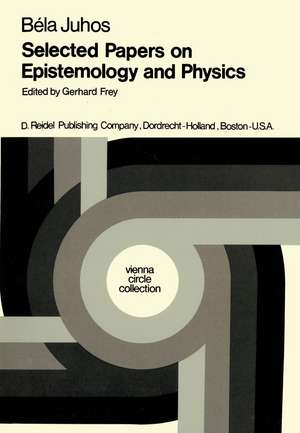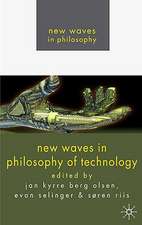Selected Papers on Epistemology and Physics: Vienna Circle Collection, cartea 7
Autor B. Juhos Editat de G. Frey, Henk L. Mulderen Limba Engleză Hardback – 31 dec 1976
| Toate formatele și edițiile | Preț | Express |
|---|---|---|
| Paperback (1) | 1220.57 lei 6-8 săpt. | |
| SPRINGER NETHERLANDS – 31 dec 1976 | 1220.57 lei 6-8 săpt. | |
| Hardback (1) | 1227.36 lei 6-8 săpt. | |
| SPRINGER NETHERLANDS – 31 dec 1976 | 1227.36 lei 6-8 săpt. |
Din seria Vienna Circle Collection
- 18%
 Preț: 1668.06 lei
Preț: 1668.06 lei - 18%
 Preț: 1226.73 lei
Preț: 1226.73 lei - 18%
 Preț: 955.40 lei
Preț: 955.40 lei - 18%
 Preț: 1230.21 lei
Preț: 1230.21 lei - 18%
 Preț: 1227.21 lei
Preț: 1227.21 lei - 15%
 Preț: 640.24 lei
Preț: 640.24 lei - 18%
 Preț: 1224.06 lei
Preț: 1224.06 lei -
 Preț: 391.99 lei
Preț: 391.99 lei - 18%
 Preț: 1543.66 lei
Preț: 1543.66 lei - 18%
 Preț: 3024.70 lei
Preț: 3024.70 lei - 18%
 Preț: 1219.77 lei
Preț: 1219.77 lei - 18%
 Preț: 1224.54 lei
Preț: 1224.54 lei - 15%
 Preț: 642.03 lei
Preț: 642.03 lei - 15%
 Preț: 645.60 lei
Preț: 645.60 lei - 18%
 Preț: 944.51 lei
Preț: 944.51 lei - 15%
 Preț: 647.92 lei
Preț: 647.92 lei - 18%
 Preț: 1397.68 lei
Preț: 1397.68 lei - 18%
 Preț: 1228.96 lei
Preț: 1228.96 lei - 18%
 Preț: 1235.08 lei
Preț: 1235.08 lei - 18%
 Preț: 1224.95 lei
Preț: 1224.95 lei - 18%
 Preț: 1223.25 lei
Preț: 1223.25 lei - 15%
 Preț: 638.76 lei
Preț: 638.76 lei - 15%
 Preț: 642.68 lei
Preț: 642.68 lei - 18%
 Preț: 948.47 lei
Preț: 948.47 lei
Preț: 1227.36 lei
Preț vechi: 1496.78 lei
-18% Nou
Puncte Express: 1841
Preț estimativ în valută:
234.85€ • 245.86$ • 194.33£
234.85€ • 245.86$ • 194.33£
Carte tipărită la comandă
Livrare economică 05-19 aprilie
Preluare comenzi: 021 569.72.76
Specificații
ISBN-13: 9789027706867
ISBN-10: 9027706867
Pagini: 372
Ilustrații: XXI, 350 p.
Dimensiuni: 210 x 297 x 26 mm
Greutate: 0.72 kg
Ediția:1976
Editura: SPRINGER NETHERLANDS
Colecția Springer
Seria Vienna Circle Collection
Locul publicării:Dordrecht, Netherlands
ISBN-10: 9027706867
Pagini: 372
Ilustrații: XXI, 350 p.
Dimensiuni: 210 x 297 x 26 mm
Greutate: 0.72 kg
Ediția:1976
Editura: SPRINGER NETHERLANDS
Colecția Springer
Seria Vienna Circle Collection
Locul publicării:Dordrecht, Netherlands
Public țintă
ResearchCuprins
I. Orders of Causality.- II. Causality Commentson the Physicalist Theory of Science.- 1. Verification and Elucidation.- 2. Elimination of Metaphysical Formulations by Means of the Physical Language.- 3. The ‘Privileged Position’ of Protocol Propositions and the Physicalist Criterion of Probation.- 4. Obtaining the Protocol Propositions.- 5. The ‘True’ Science.- III. Empiricism and Physicalism.- IV. Forms of Negation of Empirical Propositions.- 1. Forms of Negation.- 2. ‘Complete’ and ‘Incomplete’ Contradictions.- 3. The Obtaining and Verifying of Propositions.- 4. Negation of Constatations.- 5. Incompatibility of ‘Protocol Statements’.- Postscript.- V. Principles of Logical Empiricism.- 1. Reality Concepts, Metaphysical and Empirical.- 2. Invariant Systems of Statements.- 3. Non-Behaviouristic Verification.- 4. K-Statements and Invariant Systems of Statements.- VI. The Method of Epistemological Analysis.- 1. Analysis of Form and of Content.- 2. Formal Analysis of the Concept of Existence.- 3. Content Analysis of the Concept of Causality.- VII. Probability Inferences as Syntactic Inferential Forms.- 1. Relations of Consequence, Deductive and Probable.- 2. The System of Relations of Probable Consequence.- 3. ‘Probable Consequence’ and ‘Logical Truth’.- VIII. ‘Positive’ and ‘Negative’ Use of Statements.- 1. Truth Value and Content.- 2. Conditions to be Satisfied by any Definition of Truth.- 3. ‘Positive’ and ‘Negative’ Use of Statements.- 4. Negation and Falsity.- 5. Confusion of Positive with Negative Use.- 6. The Recursive Definition of the Concept of Truth.- IX. The New Form of Empirical Knowledge.- 1. The ‘Empirical Continuous’ Form of Knowledge of Classical Physics.- 2. Uncertainty Domains as Prerequisite for theEmpirical-Fictitious Form of Knowledge.- 3. Probability Description, a Special Case of the Empirical Fictitious Form of Knowledge.- 4. Probability Functions as Relations between Measured and Fictitious Values.- 5. The Empirical Fictitious Method Conditioned by Measuring Procedures.- 6. The Definition of Probability Functions by Repeated Application of the Empirical-Fictitious Method.- X. The Methological Symmetry of Verification and Falsification.- 1. Like Names for Unlike Concepts.- 2. Empirical Propositions about Finitely and Infinitely.- Many Cases.- 3. Wittgenstein’s Verification Thesis.- 4. Propositions about Finitely and Infinitely Many Cases. The Methodologies of Wittgenstein, Carnap, and Popper.- 5. ‘Asymmetrical’ Falsification Theories.- 6. Criteria of Scientific Progress.- 7. ‘Complete’ and ‘Progressive Partial’ Testability.- XI. Three Sources of Knowledge.- 1. The Triadic Method.- 2. Data of Consciousnes—Logico-Mathematical Constructions — Methods of Empirical Content.- 3. Three concepts of ‘Truth’ and ‘Probability’.- XII. The Triadic Method.- 1. Elements of Linguistic Representation and the Triadic Method.- 2. The Triadic Analysis of ‘Truth’.- 3. The Triadic Analysis of ‘Probability’.- 4. The Triadic Analysis of ‘Number’.- 5. The Triadic Analysis of ‘Philosophic Expressions’.- XIII. The Method of Fictitious Predicates.- 1. Scientific and Speculative Philosophy.- 2. ‘Operative’ and ‘Fictitious’ Existence.- I: Predicates as Descriptive Concept-Forms.- 1. The Existence of Logico-Linguistic Forms.- 2. Dispositional Concepts as Fictitious Predicates.- 3. Characterization of Phenomena by Fictitious Quantities.- II: Predicates as Quantities Characterizing States.- 4. Characterizing by Infinite Values ofQuantities.- 5. Characterizing Phenomena in Uncertainly Ranges by Means of Fictitious Values (‘Values of Measurement’).- 6. Logical Analysis of the Concepts ‘Motion’ and ‘Rest’.- 7. Logical Analysis of the Relativity Principle.- 8. The Clock Paradox.- 9. Conditions, under which the Relativity Principle Does not Hold.- 10. Domains of Uncertainty as a Presupposition for Applying the New Method.- III: Predicates as Probability Quantities.- 11. Analytic-Deductive Inferences. Inferences from Conjunctive Classes of Propositions.- 12. Inferences from Disjunctive Classes of Propositions. Probability Inferences.- 13. Systems of Probability Metric and Their Order.- 14. The Characterization of States by Conjunctive and Disjunctive Classes of Propositions.- 15. Presuppositions of Measurement in Classical and Relativistic Physics.- 16. Description by Ranges of Quantities.- 17. Definition of Probability Quantities by Means of Functions.- 18. Descriptions by Means of Probability and Metrical Quantities.- 19. Uncertainty Domains as Prerequisite for the Method of Fictitious Predicates.- 20. The Definition of Probability Functions by Means of Operators.- 21. Empirical and Fictitious Existence of Predicates.- 22. Theories of Measurement as a Presupposition of Exact-Continuous and of Probability Description.- 23. The Epistemological Conditions for Applying the Method of Fictitious Predicates.- 24. The Probability Field.- 25. Probability Description and Indeterminacy of Phenomena.- 26. The Logical Meaning of Quantisation. First and Second Quantisation.- 27. The Quantisation of Electromagnetic Fields.- IV. Empirical-Fictitious Knowledge.- 28. Active and Fictitious Causality.- 29. Greatest Possible and Least Possible Physical Constants.- 30. The New Form of Knowledge.- 31. TheMatrix Field and the Probability Wave Field.- 32. Probability Description in Biology.- Index of Names.















